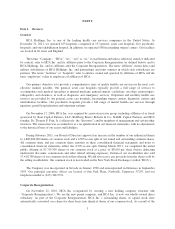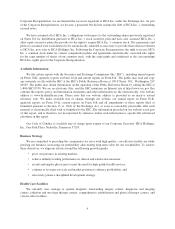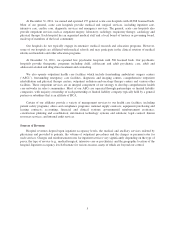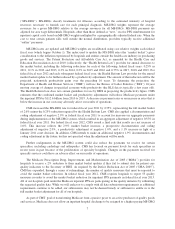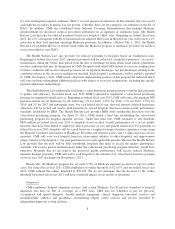HCA Holdings 2011 Annual Report Download - page 16
Download and view the complete annual report
Please find page 16 of the 2011 HCA Holdings annual report below. You can navigate through the pages in the report by either clicking on the pages listed below, or by using the keyword search tool below to find specific information within the annual report.Through DRA 2005, Congress has expanded the federal government’s involvement in fighting fraud, waste
and abuse in the Medicaid program by creating the Medicaid Integrity Program. Among other things, DRA 2005
requires CMS to employ private contractors, referred to as Medicaid Integrity Contractors (“MICs”), to perform
post-payment audits of Medicaid claims and identify overpayments. MICs are assigned to five geographic
regions and have commenced audits in states assigned to those regions. The Health Reform Law increases federal
funding for the MIC program for federal fiscal year 2011 and later years. In addition to MICs, several other
contractors and state Medicaid agencies have increased their review activities. The Health Reform Law expands
the RAC program’s scope to include Medicaid claims.
Managed Medicaid
Managed Medicaid programs enable states to contract with one or more entities for patient enrollment, care
management and claims adjudication. The states usually do not relinquish program responsibilities for financing,
eligibility criteria and core benefit plan design. We generally contract directly with one of the designated entities,
usually a managed care organization. The provisions of these programs are state-specific.
Enrollment in managed Medicaid plans has increased in recent years, as state governments seek to control
the cost of Medicaid programs. However, general economic conditions in the states in which we operate may
require reductions in premium payments to these plans and may reduce enrollment in these plans.
Accountable Care Organizations and Bundled Payment Initiatives
The Health Reform Law requires HHS to establish a Medicare Shared Savings Program (“MSSP”) that
promotes accountability and coordination of care through the creation of Accountable Care Organizations
(“ACOs”), beginning no later than January 1, 2012. The program will allow certain providers and suppliers
(including hospitals, physicians and other designated professionals) to voluntarily form ACOs and work together
along with other ACO participants to invest in infrastructure and redesign delivery processes to achieve high
quality and efficient delivery of services. The program is intended to produce savings as a result of improved
quality and operational efficiency. ACOs that achieve quality performance standards established by HHS will be
eligible to share in a portion of the amounts saved by the Medicare program. HHS has significant discretion to
determine key elements of the program. In 2011, CMS, the HHS Office of Inspector General (the “OIG”) and
certain other federal agencies released a series of rules and guidance further defining and implementing the ACO
program. These rules and guidance provide for two different ACO tracks, the first of which allows ACOs to
share only in the savings under the MSSP. The second track requires ACOs to share in any savings or losses
under the MSSP but offers ACOs a greater share of any savings realized under the MSSP. As authorized by the
Health Reform Law, the rules and guidance also provide for certain waivers from fraud and abuse laws for
ACOs. In addition, beginning January 1, 2012, CMS has authorized 32 organizations to participate in the
“Pioneer” ACO program, which is similar to, but separate from, the ACOs created under the MSSP regulations.
The Health Reform Law created the Center for Medicare and Medicaid Innovation with responsibility for
establishing demonstration projects and other initiatives in order to identify, develop, test and encourage the
adoption of new methods of delivering and paying for healthcare that create savings under the Medicare and
Medicaid programs while improving quality of care. For example, the Center for Medicare and Medicaid
Innovation has announced a voluntary bundled payment initiative that will link payments to participating
providers for services provided during an episode of care. In addition, the Health Reform Law requires HHS to
establish a five-year, voluntary national bundled payment pilot program for Medicare services beginning no later
than January 1, 2013. Under the program, providers would agree to receive one payment for services provided to
Medicare patients for certain medical conditions or episodes of care. In addition, the Health Reform Law
provides for a five-year bundled payment pilot program for Medicaid services. HHS may select up to eight states
to participate, and these state programs may target particular categories of beneficiaries, selected diagnoses or
geographic regions of the state. The selected state programs will provide one payment for both hospital and
physician services provided to Medicaid patients for certain episodes of inpatient care.
13


